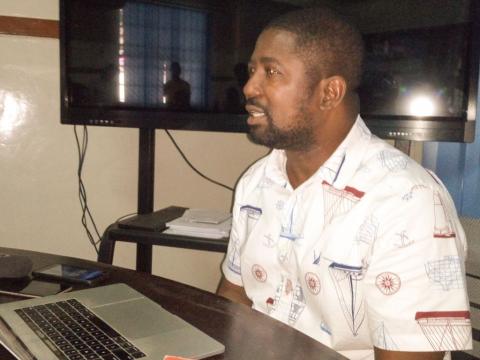By Mohamed Jaward Nyallay
A new paper by the governance think tank, Institute for Governance Reform (IGR) has called on the media and Civil Society (CSOs) to push for political reforms within Sierra Leone’s two biggest political parties: Sierra Leone Peoples Party (SLPP) and All Peoples Congress (APC).
The paper titled: “Uniting Bo and Makeni: Politics and the Prospect for National Cohesion in Sierra Leone,” looks at the cause of political division and the benefits to different political actors in the country.
SLPP and APC are the central subjects of the paper, which gives critical examination of how they are keeping the country divided.
IGR Executive Director, Andrew Lavalie said: “We decided to look at these two parties because during almost every election about 85% of the votes go to these two parties.”
The Northern region is dominated by the Themne tribe whiles the South-East is dominated by the Mende tribe. The North is the stronghold of the APC, whiles the South-East is the stronghold of the SLPP.
“The moment you talk about unity then you are going to have losers. In this case the losers will be those who are fuelling division,” Lavalie said at the launch of the report.
He added: “All the tension between these two tribes boils down to few people trying to control wealth. This paper is trying to highlight the political constraints that have led us here. We focused on what parties are doing that is not promoting cohesion.”
The paper highlights different characteristics of SLPP and APC that are currently undermining national unity. It states that the ruling SLPP government is framing government policy as tit-for-tat, appeasing party stronghold, dining with spoilers and thinking about the short term vision of 2023.
About the APC, their own actions were narrowed down in the paper to four points: using their membership to shield themselves from accountability, keep supporters aggrieved, discredit SLPP whiles being unwilling to reform and keeping the party as a Northern outfit.
Political tension have always existed between the two parties with the two regions of the country been pitted against each other to keep party support intact. During the country’s last election in 2018, tribal rhetoric sharply divided the country along political lines, provoking sporadic violence in some parts of the country.
Lavalie said the circle of division and isolation has been broken, and that the solution is to form a citizen movement that will demand for national cohesion, noting that that effort should be led by civil society and the media.
“Citizens have to step and say enough is enough. The media can contribute by not promoting divisive rhetoric,” he said.
Politics have polarized almost all institutions in the country, including some section of the media and CSO communities. Lavalie recognizes this challenge, but he said the way around this must be through capacity building.
“They need to build capacity and be professional and know that they can live with that,” he said.
Copyright © 2020 Politico Online








